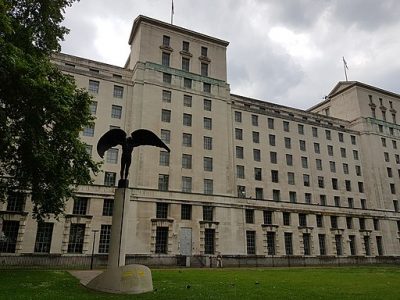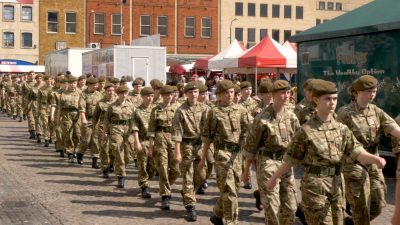Why recent developments in character education indicate there’s no need for a military ethos
The Department for Education has given out its £3.5 million ‘Character Awards’ and its £3.5 million Character Education grants, both championed by Secretary of State for Education Nicky Morgan, to 27 schools and youth organisations in England, and 14 youth projects, respectively. Despite the DfE’s heralding of ‘military ethos‘ as an excellent means of developing character, none of those awarded mention military-style activities in their descriptions (see here and here) and the DfE says it ‘does not hold the information’ on whether any of the Character Award projects are military ethos-oriented.
Instead, the projects include Personal Social Health & Citizenship Education, Citizenship, community and charity volunteering, outdoor activities without any military aspect, and empathy-building activities. They were selected by a panel of education and youth work experts. Particularly striking is the £500,000 scheme to bring professional rugby players into schools ‘to instil character and resilience in disaffected children’. Comments from Nicky Morgan and Chief Executive of Premiership Rugby Mark McCafferty on the values that rugby players can imbue are very reminiscent of the rhetoric around the ‘military ethos in schools’ programme.
All this suggests that non-military approaches to developing ‘character’ can be at least as effective as military approaches. Indeed, Birmingham University’s Jubilee Centre for Character & Virtues 2015 report Building Character through Youth Social Action provides a wealth of evidence of the efficacy of non-military ethos initiatives in developing important skills in young people. The providers interviewed for the study work with over one million young people; the Army, Air, Sea, or Combined Cadets were not among them, though the Prince’s Trust (which since 2013 has been a provider of the DfE-funded ‘alternative provision with a military ethos’ for ‘disengaged’ students), Youth United (whose network of ten youth organisations includes the Army, Sea, and Air Cadets, and which is also one of the Character Education grant receipients), and Prince Charles’ Step Up To Serve initiative (the government’s press release photo of which features Cadets prominently) were.
The report states that the government’s own research has found ‘robust evidence that young people who take part in social action initiatives develop some of the most critical skills for employment and adulthood in the process’, including empathy, problem-solving, grit and resilience, cooperation, and a sense of community.
Emphasising that it is social action which is vital in building character, the report notes: ‘This is well recognised in the education sector, with most young people getting involved in social action through school or college…61% of interviewees said that young people already have a number of virtues before taking part in social action. For some, this is because certain virtues are innate; for others, it is because they have learnt them in different ways… Just under half of interviewees stated that some virtues can be ‘caught’…as by-products…They said that this happens most often through exposing young people to opportunities, which providers create, in which they can discover and practise those virtues, but also includes experiential learning…peer-to-peer learning, and role-modelling…Just three interviewees (13%) said they believe that virtues can be taught, such as through guidance, formal coaching or training programmes.’
There is no suggestion that any particular type of facilitator or activity is particularly well-placed to achieve this, in contrast to the assertions behind military ethos initiatives. So, military-related activities are far from being the only way that young people can develop these abilities. Indeed, the television advert for recruiting teachers launched in September 2014 emphasises that inspiring students, for example by helping them to improve their confidence, is what all teachers do. The list of character awards attests to the fact that schools are already very active in this area; it is very much part of their core business.
Yet in one batch of funding in late 2014 eight military ethos projects received more than two-thirds the amount of the total Character Award and character education grant funding (covering 41 projects). Nicky Morgan singled out the Cadets in a January 2015 speech, implying that they were one of the “best” character projects.
What is character, anyway? And how can it be measured?
An even more recent report on character education, jointly written by think-tank Demos and the Jubilee Centre, suggests that character education in schools is required by the Education Act 2002, which demands that all maintained schools “promote the spiritual, moral, cultural, mental and physical development of pupils”, which has been summarised under the spiritual, moral, social and cultural development (SMSC) requirement in the Ofsted inspection framework
However, the Jubilee Centre solo report raises important questions about the rigour of existing studies on the development of ‘character’ among young people: ‘providers do not have an alternative to the umbrella term ‘character’, but have many alternatives to what we would define as ‘virtues’. While ‘character’ was cited by some providers, it was often used interchangeably with multiple other terms…Almost half of interviewees explained that their organisation does not have a ‘formal definition’ of character. As such, they had not necessarily thought about its meaning until prompted in the interview and gave personal rather than organisational definitions. These responses generally focused on three themes: citizenship and helping others; actions and motivations; and personality and ‘who you are’.
The report found that numerous ‘performance’, ‘civic’, and ‘moral’ virtues are developed by all of the initiatives, from leadership to citizenship to empathy, respectively. It went on to note that, ‘At present, few robust forms of measurement are used by providers. This makes it difficult for providers to create comprehensive theories of change and prove positive impact…The most common form of measurement is self-assessment of performance virtues, testing young people’s perceptions of their own development, and more providers would like to implement more ‘robust’ measures…This study strongly indicates that providers would welcome more guidance on alternative and robust forms of measurement specific to youth social action’.
Similar recommendations were made in the even more recent report on character education, jointly written by think-tank Demos and the Jubilee Centre.
Given this, and following our previous critiques of evaluations of alternative provision with a military ethos as well as of the evidence that has been used to justify the ‘military ethos in schools’ programme as a whole, it’s worth exploring the recent evaluation of the alternative provision with a military ethos organisation Challenger Troop, which works with disadvantaged 8-18 year olds in London and south-east England. A summary of the evaluations of Challenger Troop’s work in the academic year 2013-14 indicate improvements in the attainment of students involved in their activities, but the data is notably limited: it only comes from a small sample of 29 schools; the data was collected by self-assessment questionnaires completed by students (rather than questionnaires for teachers and parents/guardians); unauthorised absences only fell in some schools; and the report itself acknowledges that studies over a longer period of time are required to provide stronger evidence that Challenger Troop has improved attainment.
In short, Challenger Troop’s evaluation doesn’t meet the high standards of evaluation called for in the Jubilee Centre’s report. The evaluation doesn’t seem to offer any specific suggestions of how exactly Challenger Troop’s activities have achieved the successes that they appear to have. If it is largely down to activities that are not exclusive to the military, such as outdoor and trust-building exercises, why are they and other military ethos initiatives continuing to get proportionally so much more government funding and media attention than other ‘character’ initiatives?
It will be very interesting to see if military ethos initiatives will be explored in the findings of the Education Endowment Foundation’s £1m DfE-funded research on the most effective ways that character can be taught in schools. As the Navy themselves recently acknowledged after students on ‘alternative provision with a military ethos’ visited a Navy base, ‘participating students…learn a variety of skills and competencies including teamwork, communication, volunteering, discipline and self reliance. All skills that are essential, not only for the Armed Forces, but for any career the students choose to follow.’
We would hope that any further research would question not only whether ‘military ethos’ activities in schools are particularly effective given the significance afforded them, but also whether military-style activities are appropriate for school children, and whether they come with another, more defence-orientated agenda that is not necessarily in the best interests of young people in education.
See more: military in schools/colleges, character building, education, military ethos
Like what you read?
> Sign up for our newsletter or blog notifications
> Support our work – from just £2 a month










